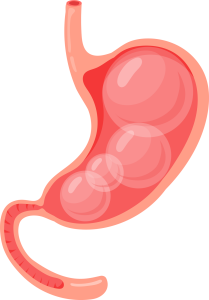Junk food has become an integral part of modern diets, with fast food chains, sugary snacks, and processed meals easily accessible and often tempting. While these foods are convenient and tasty, they have significant health risks. Regular consumption of junk food can lead to a wide range of health problems, from weight gain and heart disease to digestive system issues. Junk food, typically high in unhealthy fats, refined sugars, salt, and additives, heavily burdens the body, particularly the digestive system.
This article explores the dangers of junk food on health, focusing on its negative impact on the digestive system. Additionally, we will discuss how digestive enzymes can help manage some of the side effects of junk food consumption, improving digestion and alleviating symptoms such as bloating, indigestion, and gas.
The Health Dangers of Junk Food
Junk food is typically calorie-dense but nutritionally poor. Its high content of refined sugars, unhealthy fats, sodium, and artificial additives contributes to several serious health problems. Some of the key dangers associated with regular consumption of junk food include:
Weight Gain and Obesity
Junk food contains empty calories, providing energy without essential nutrients like vitamins, minerals, or fiber. The high sugar and fat content in junk food leads to excessive calorie consumption, which can quickly contribute to weight gain and, over time, obesity. Obesity is linked to numerous health problems, including heart disease, type 2 diabetes, and certain cancers.
Heart Disease
The trans fats, saturated fats, and high sodium levels found in many types of junk food can increase cholesterol levels and blood pressure. This combination puts individuals at a higher risk of developing heart disease, which is one of the leading causes of death worldwide. Junk food’s contribution to inflammation and insulin resistance also exacerbates heart disease risk.
Type 2 Diabetes
The refined sugars in junk food cause rapid spikes in blood sugar levels, leading to insulin resistance over time. This resistance makes it more difficult for the body to control blood sugar, increasing the likelihood of developing type 2 diabetes. Consuming sugary junk food also contributes to weight gain, which is another significant risk factor for diabetes.
Digestive Problems
Junk food is low in fiber and essential for proper digestion and bowel health. A diet rich in junk food can lead to constipation, indigestion, bloating, and irregular bowel movements. The excess fat and additives in junk food can also irritate the stomach lining, causing discomfort and even contributing to conditions like gastroesophageal reflux disease (GERD).
The Effects of Junk Food on the Digestive System
The digestive system breaks down food into smaller components so the body can absorb nutrients and use them for energy. However, junk food can severely disrupt this process due to its lack of essential nutrients and heavy reliance on unhealthy ingredients. Here are some of the most common effects of junk food on the digestive system:
Sluggish Digestion
Junk food is often high in fat, which takes longer to digest than other nutrients like carbohydrates or proteins. Consuming large amounts of fatty junk food can slow the digestive process, leading to sluggish digestion. This can cause uncomfortable symptoms like bloating, fullness, and gas.
Acid Reflux and Heartburn
Fried and greasy foods, often found in fast food, can relax the lower esophageal sphincter (LES), the muscle that prevents stomach acid from rising into the esophagus. When the LES becomes too relaxed, it can lead to acid reflux or heartburn, a burning sensation in the chest and throat caused by stomach acid moving upward.
Constipation
Junk food is typically low in dietary fiber, which is necessary for keeping the digestive system regular. Fiber helps to add bulk to stool and promotes its passage through the intestines. Without enough fiber, the digestive system slows down, leading to constipation and discomfort.
Irritable Bowel Syndrome (IBS) Flare-Ups
Individuals with irritable bowel syndrome (IBS) often find that junk food, particularly foods high in fat and sugar, can trigger or worsen their symptoms. Junk food can lead to IBS flare-ups with symptoms such as abdominal pain, diarrhea, and bloating.
Bacterial Imbalance in the Gut
Junk food lacks the nutrients necessary to support a healthy gut microbiome, which is vital to digestion, immunity, and overall health. A diet rich in junk food can promote the growth of harmful bacteria in the gut, leading to gut dysbiosis (an imbalance of gut bacteria). This imbalance can cause bloating, gas, indigestion, and even inflammation in the digestive tract.
How Digestive Enzymes Help Manage the Impact of Junk Food on the Digestive System
While the best approach to managing the health risks of junk food is to reduce or eliminate its consumption, digestive enzymes can provide valuable support when it is consumed. Digestive enzymes are proteins that help break down food into smaller molecules, allowing the body to absorb nutrients more efficiently. They are naturally produced in the body but can be supplemented to improve digestion, especially when consuming hard-to-digest foods.
Here’s how specific digestive enzymes can help manage the digestive side effects of junk food:
Lipase
Lipase is the enzyme breaking down fats into fatty acids and glycerol. Since junk food is often high in unhealthy fats, lipase can help the body digest these fats more efficiently, preventing the sluggish digestion and bloating associated with fatty meals.
How Lipase Helps: By improving fat digestion, lipase can reduce the heaviness and discomfort that follow a high-fat junk food meal, preventing symptoms like bloating, gas, and indigestion.
Amylase
Amylase breaks down carbohydrates, particularly starches and sugars, into simpler sugars like glucose. Junk food often contains large amounts of refined carbohydrates and sugars, which can be challenging to digest and lead to blood sugar spikes.
How Amylase Helps: By breaking down carbohydrates more effectively, amylase helps prevent the fermentation of undigested carbs in the gut, reducing gas and bloating. It also helps regulate digestion, preventing rapid blood sugar spikes after eating sugary junk foods.
Protease
Protease is the enzyme that breaks down proteins into amino acids, which the body can absorb. Processed junk foods, such as burgers and chicken nuggets, often contain large amounts of protein and various preservatives and additives.
How Protease Helps: Protease improves protein digestion, reduces strain on the digestive system, and helps alleviate indigestion and bloating caused by poorly digested proteins in junk food.
Alpha-Galactosidase
Alpha-galactosidase helps break down complex carbohydrates in foods like beans, legumes, and vegetables. While not directly linked to most junk food, alpha-galactosidase can still help manage the gas and bloating caused by processed carbohydrates in junk food.
How Alpha-Galactosidase Helps: This enzyme helps to break down complex sugars found in processed foods, preventing the fermentation of undigested carbohydrates in the gut, which can cause bloating and flatulence.
Lactase
For individuals with lactose intolerance, lactase is essential for digesting lactose, the sugar found in dairy products. Many junk foods, such as milkshakes, ice cream, and cheesy snacks, contain dairy, which can trigger digestive discomfort in people with lactose intolerance.
How Lactase Helps: Lactase ensures that dairy products are properly digested, preventing the bloating, gas, and diarrhea commonly resulting from consuming lactose-containing junk foods.
How Goodness Digestive Enzymes Can Help
Goodness Digestive Enzymes offers a comprehensive blend of enzymes designed to support digestion, even after consuming hard-to-digest foods like junk food. By improving the breakdown of fats, carbohydrates, proteins, and dairy, Goodness Digestive Enzymes helps to alleviate the digestive discomfort commonly associated with junk food consumption. The product includes key enzymes such as lipase, amylase, protease, lactase, and alpha-galactosidase, which target the food components most likely to cause bloating, gas, and indigestion after consuming junk food.
Regularly using Goodness Digestive Enzymes allows individuals to experience improved digestion, reduced bloating, and better gut health, even when junk food is occasionally part of their diet.
Conclusion
Junk food may be tasty and convenient, but its negative impact on overall health and the digestive system is significant. Frequent junk food consumption can cause severe consequences, from weight gain and heart disease to bloating and indigestion. While reducing or eliminating junk food from the diet is the best approach, digestive enzymes can provide valuable support in managing the digestive discomfort that junk food often causes.
Goodness Digestive Enzymes offer a natural way to support digestion and alleviate the side effects of junk food. They help the body break down fats, carbohydrates, proteins, and dairy more effectively. By using digestive enzymes alongside a balanced diet, individuals can enjoy better digestive health, even when junk food is involved.
-
Product on sale
 Goodness Digestive EnzymesOriginal price was: $ 29.95.$ 25.95Current price is: $ 25.95.
Goodness Digestive EnzymesOriginal price was: $ 29.95.$ 25.95Current price is: $ 25.95.






